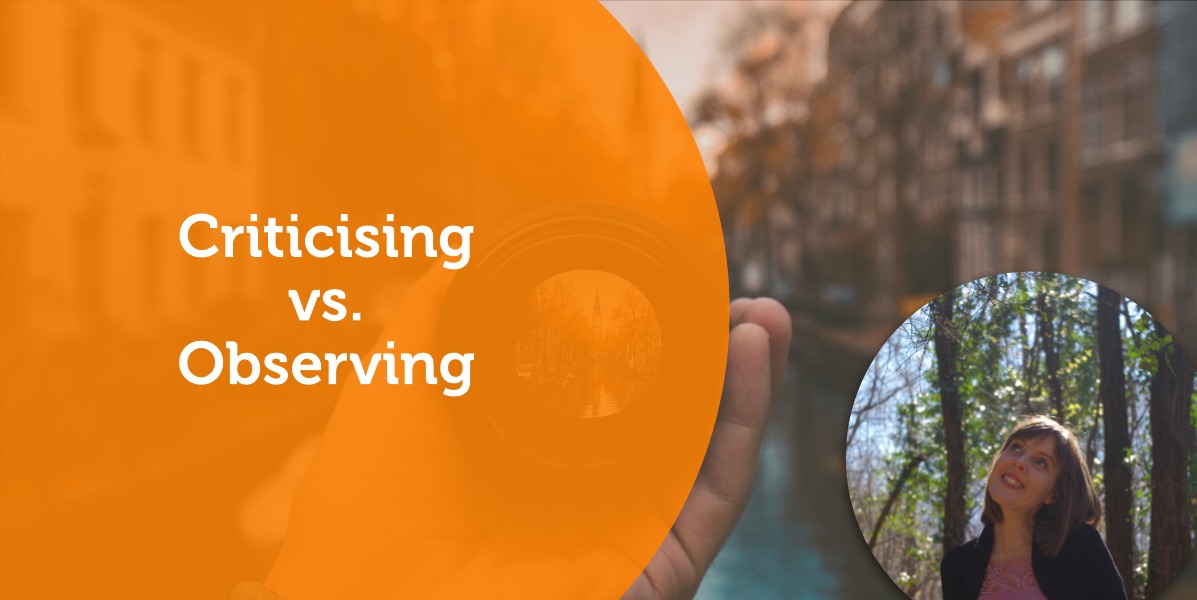 A Coaching Power Tool Created by Silvia Piaia
A Coaching Power Tool Created by Silvia Piaia
(Life and Parenting Coach, ITALY)
A path from criticizing through observing to praising
The Oxford Dictionary of English describes the act of criticizing somebody or something as “to say that you disapprove of somebody/something; to say what you do not like or think is wrong about somebody/something”.
The mere act of criticizing triggers a waterfall of negative behaviors or feelings towards ourselves and others, it makes us feel blue towards everything and everybody. When we are in the self-criticism modus, we move the focus from healthy analysis to absolute blame towards ourselves or others for situations we or they might even not be responsible for, thus putting ourselves or others down as a whole person instead of simply analyzing the particular situation or action in that present moment. This kind of behavior makes us persist in analyzing mistakes and situations and eventually puts us in a feeling of constant worry, thus making it impossible to enjoy the here and now. We see everything as either this or that and don’t acknowledge the positivity of successes or accomplishments on the way. This lowers inevitably our self-esteem: we are never satisfied with our achievements, set high standards, and become defensive towards everything and everybody. We also tend to avoid asking for help and most tragically we are not willing to take risks or actions at all in order to achieve our goals. Ironically, we are so submerged in these self-destroying feelings, which impede us to recognize possible positive results, that naturally, our achievements start to fall beneath our capabilities starting an endless downward spiral.
On the other hand, self-analysis can help us to break this vicious circle. Self-analysis as observing ourselves and others in the sense of “to watch somebody/something carefully, especially to learn more about them” makes us not only learn more about others, the situation and thus ourselves, it also can lead us to a healthy act of praising/complimenting, thus giving value to what we do, achieve and feel. It helps us to measure things using our values and goals and to take action in order to achieve what we want. It helps us to be the best we can, to recognize even in bad situations the efforts and achievements we reached in spite of a hard situation. A healthy analysis of ourselves and others helps us getting the needed objectivity towards a situation and what went wrong. It makes us focus on the behavior instead of us and others as persons. It even makes us accept constructive feedback and welcome compliments. We stop seeing everything just in black or white by giving space to a whole rainbow of successes and accomplishments. We start to see the “take action” as a safe path for things, giving space to satisfaction and therefore achieving our personal needs. It enables us to be authentically ourselves or see others as the authentical version of themselves, thus letting us enjoy the moment here and now and live life as it is.
Moving the focus from unhealthy (self) criticism through observing
When we are judgmental, we are playing in defense. As the Dalai Lama says: “If you have a self-centered attitude, then you’ll have more fear, hesitance, distrust.”On the other hand, “Kindness and compassion give rise to self-confidence, which in turn empowers us to be honest, truthful and transparent”. By being kind and compassionate towards ourselves and others, therefore not merely criticizing them but observing and analyzing with active interest the situation, the behavior, and why something went wrong, we empower ourselves.
Support for coaching in gaining the power of kind (self-)knowledge
It is especially through powerful listening, powerful questioning, accountability, acknowledgment, and gratitude that a coach can support his coachees in taking action and moving from unhealthy self-criticism towards a healthy self-analysis.
The tools which can be helpful in this case are reframing the perspectives (from judgemental to understanding), creating an environment of trust vs doubt (not only through the session but also in the coachees’ life and environment), by supporting the coachees to respond instead of reacting (observe and learn instead of merely criticize and put down) and by supporting them to develop respect towards themselves, others and the situation.
Conclusion
It is by enabling us to gain a deeper, compassionate understanding of why we and others behave in a certain way that we get empowered to be the best we can, to achieve great things in line with our values and goals.
Here are some questions you could use to help someone to move his focus from criticism to observing:
References:
Mike Bundant of iNLP Center, author of Your Achilles Eel: Discover and Overcome the Hidden Cause of Negative Emotions, Bad Decisions, and Self-Sabotage
Dalai Lama posts on Twitter, especially on 12. May 2015